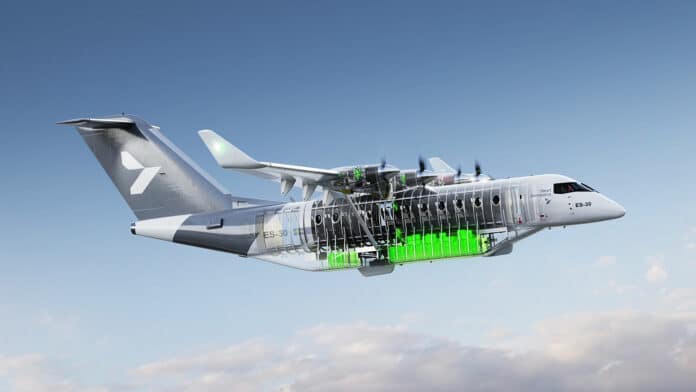BAE Systems has joined forces with Swedish electric airplane maker Heart Aerospace to develop a battery system for Heart’s ES-30 regional electric airplane.
The battery system will be the first of its kind to be integrated into an electric conventional takeoff and landing (eCTOL) regional aircraft, allowing it to operate efficiently with zero emissions and low noise.
The collaboration will utilize BAE Systems’ 25 years of expertise in electrifying large, heavy-duty industrial vehicles. “BAE Systems’ extensive experience in developing batteries for heavy-duty ground applications, and their experience in developing safety critical control systems for aerospace, make them an ideal partner in this important next step for the ES-30 and for the aviation industry,” said Sofia Graflund, chief operating officer at Heart Aerospace. “We look forward to decarbonizing air travel together.”
Heart Aerospace first made waves in 2021 with its ES-19 electric airplane. The 19-seat electric aircraft has the potential to fly customers up to 250 miles (402 km), perfect for short-distance travel. The innovation attracted the attention of investors, including United Airlines Ventures (UAV), Breakthrough Energy Ventures (BEV), and Mesa Airlines. United Airlines and Mesa Airlines also committed to incorporating 100 ES-19 aircrafts each into their fleet a few years down the track.
Last year, the company introduced the ES-30, an electric plane driven by four electric motors and a battery system. Powered by four electric motors, the ES-30 airplane has an all-electric range of 200 km (124 miles), an extended reserve hybrid range of 400 km (248 miles) with 30 passengers, and the ability to fly up to 800 km (497 miles) with 25 passengers.
The ES-30 will also have a cost-effective and scalable upgrade path as future battery technology matures. The battery upgrade roadmap allows for increased usable energy at the same weight, resulting in longer flight durations and expanded route options.
Heart Aerospace has a total of 230 orders and 100 options for the ES-30, along with a letter of intent for an additional 108 airplanes.
